Among other things, Friedrich Engels was one of the most remarkable figures to have ever lived in Eastbourne in Sussex, and since 2020 was the bicentenary of his birth what better time to remember a legendary revolutionary socialist who was also…
- one of the most modern, cosmopolitan and educated contemporary witnesses for the entire breadth of the 19th century who analysed the development of modern industrial society in Europe
- the theorist, who long before Karl Marx focused on the key function of economics for intellectual and political development, and also pioneered social history, urban geography and thinking ecologically about humanity’s relationship to the natural environment
- as a young German writer, he was firework of correspondence, poems, polemics and drafts of plays
- a cross-border commuter and polymath between all classes, strata and genres – philosopher and bon vivant, textile entrepreneur and worker leader, scientist and politician
Biography
Friedrich Engels was born on November 28, 1820 as the eldest of nine children of the ambitious textile entrepreneur Friedrich Engels senior and his wife Elisabeth, née van Haar, in Barmen. At the request of his father, he left the Elberfeld high school a year before graduating from high school to begin an apprenticeship in the office of the Saxon consul Heinrich Leupold in Bremen. There he was – impressed by the liberal poets and publicists of Junge Deutschland – already at the age of 19 under the pseudonym Friedrich Oswald with the famous “Letters from Wupperthal”, in which he criticized misery and bigotry in the valley of the Wupper .
He completed his training in Bremen in 1841 and in the same year completed his military service as a one-year volunteer with the Royal Prussian Guard Artillery in Berlin, where he attended lectures in philosophy, oriental languages and finance as a guest student at the university and also travelled to Berlin in liberal-left Hegelian circles. In 1842 Engels met Karl Marx for the first time in Cologne, the editor-in-chief of the Rheinische Zeitung who defended the free press against Prussian censorship.
In order to enter his father’s business in Engelskirchen, Friedrich Engels senior wanted his son to understand the English methods and in 1843 introduced him to his father’s cotton mill in Manchester. During this time he made the acquaintance of the Irish factory girl Mary Burns, his future partner. Through her he got to know “Cottonopolis” in Manchester, a city full of social contradictions with inhumane living and working conditions for the workers in the textile factories. On this basis he wrote – again in Barmen – his first major study The Condition of the Working Class in England, which was one of the first empirical sociopolitical studies to have the greatest impact on the thought and work of Marx.
As Terrell Carver notes,
‘Engels worked from contemporary sources, mostly parliamentary reports and inquiries that detailed the poverty and misery of factory work. But – rather in advance of his time – he ventured into the slummy depths of the back-to-backs and airless basements into which penniless wage slaves were crammed. His access to these scenes was facilitated by Mary, his first Burns-sister partner. As an eyewitness founder of urban geography, drawing detailed maps and diagrams to make his writing vivid and persuasive, he was at the cutting edge. And so Engels poses more questions today for us than we can instantly answer, given the billions of people living in slums across the world that Mike Davis and other urban geographers, radical architects and global campaigners have pictured for us and exhaustively analysed. The Occupy movement took over public spaces to highlight contemporary conditions and other aspects of global capitalism that match Engels’s descriptions exactly.’
The collaboration with Marx, who had meanwhile emigrated to Paris, intensified; His special impulse was to introduce Marx to the economic theories of Adam Smith and David Ricardo and to develop them further together with him.
The first communist meetings took place in Elberfeld at the beginning of 1845, at which Engels organized a series of lectures together with Moses Hess. In 1846 he moved to Brussels with Marx and travelled with him to London and Manchester. In London, Engels and Marx joined the “League of the Just” in 1847, which they jointly transformed into the “League of Communists”. A year later they wrote the Communist Manifesto for this association.
In the spring of 1849 Engels took part in the barricade fighting in Barmen and Elberfeld and then in the Baden uprising. After the defeat, he fled to Switzerland and on to England, where he worked as an authorized signatory from 1850 and later as a partner in his father’s industrial company. Though Engels came from a wealthy bourgeois background, the money he earned allowed him to lead the life of a relatively well off member of British society, it also enabled the Marx family to survive, Karl Marx to write and Engels’ the space and time to develop his own work.
Friedrich Engels not only supported his friend Karl Marx financially, but was also actively involved in the creation of his publications. In many parts of the complete works of Marx and Engels, it is not possible to distinguish precisely between the two authors. Volumes 2 and 3 of Marx’s main work Das Kapital were posthumously edited by Engels from notes. In 1869, after he was able to sell his company shares, Engels moved to be close to Marx in London. After Marx’s death in 1883 at the latest, Engels became the leading intellectual figure of international socialism, also and especially of the Social Democratic Party of Germany, but remaining committed to revolutionary politics to the end of his life.
Engels regularly visited Eastbourne in later years before he died on August 5th, 1895 in his London apartment His ashes were given to the sea between England and the continent at his request, two miles out to sea off Beachy Head, near Eastbourne.
Adapted with thanks from here

